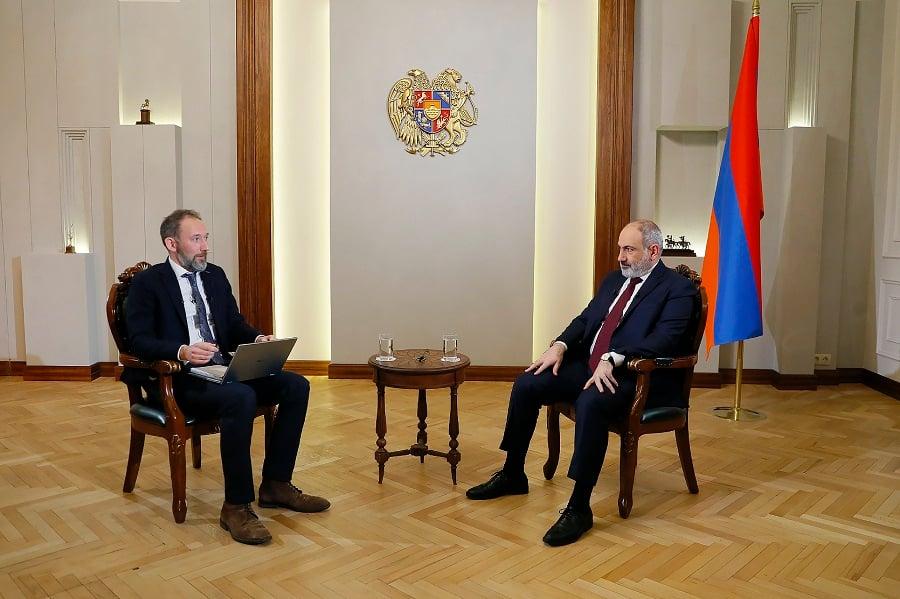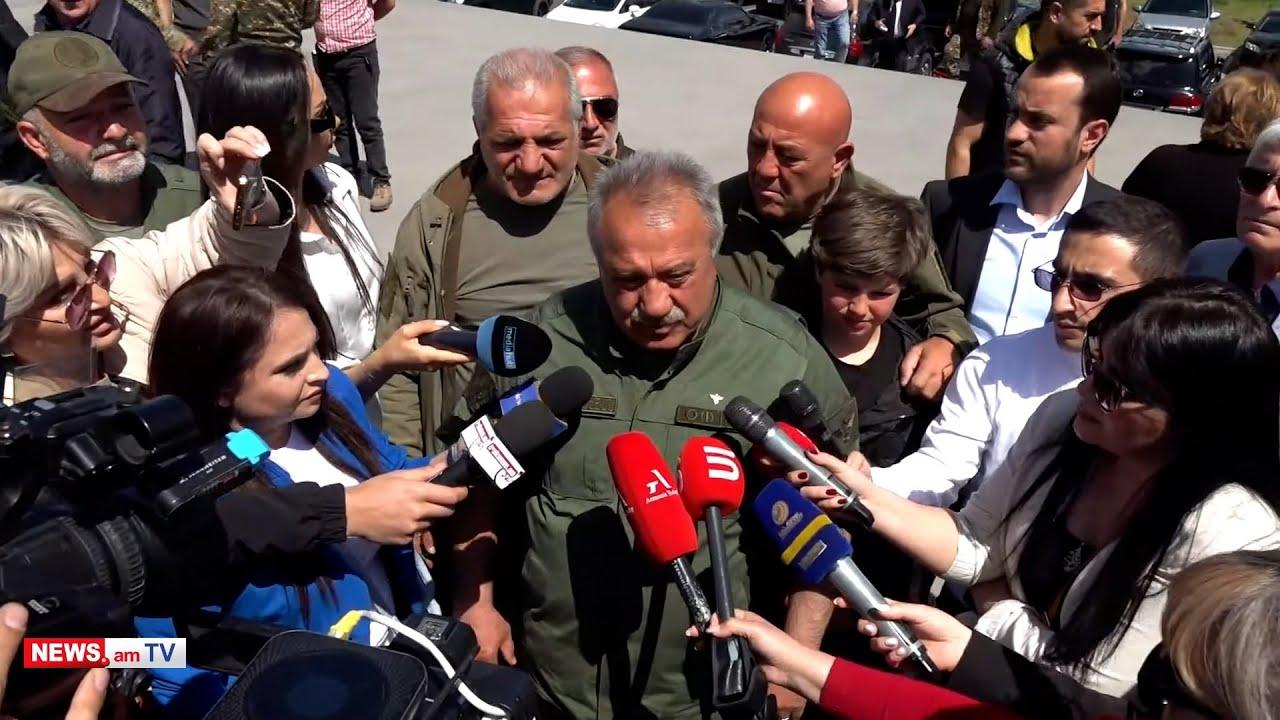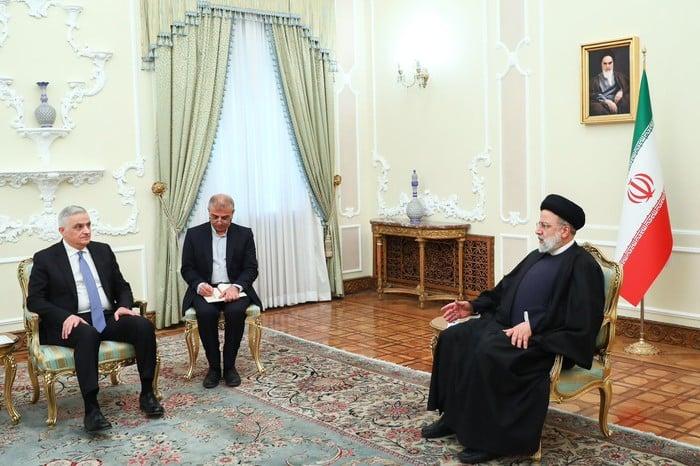Torn between war and peace: Pashinyan seeks allies and arms Bet on radicals, failure in Tehran, and U-turn towards London
The meeting between the Azerbaijani and Armenian leaders on February 17 in the presence of German Chancellor Olaf Scholz resulted in an agreement to "resolve open issues without violence". It is expected that the foreign ministers of Azerbaijan and Armenia will have another meeting shortly and continue work on a peace treaty.
In light of recent border shootings, this news is heartening. At the same time, however, Pashinyan's return to attempts at a radical reorientation of foreign policy towards the West is a clear indication of his priorities. What could be more important for Armenia than a peace treaty with one of its neighbours?
Yerevan is looking for ways to reach out to Britain
As the week drew to an end, the Armenian PM urged the leadership of the Civil Contract Party to make serious efforts to reorient its foreign policy towards Europe. At the same time, according to the newspaper Zhokhovurd, "the issue of relations with Russia was not on the agenda of the party meeting".
Nor was there much in the way of endless discussions on "European integration"; besides the EU, Pashinyan's team is also looking for ways to reach out to Armenia's closest partner, the United Kingdom. On Saturday in Munich, the Armenian prime minister met, on his initiative according to available information, with the head of the British intelligence service MI-6, Richard Moore.
At the same time, the whole of last week was spent actively discussing Armenian Prime Minister Pashinyan's almost routine interview with the British newspaper The Telegraph, which is suspected of dubious contractual arrangements. If Pashinyan's only aim was to spread pro-Western messages to the widest possible audience, it would have been more sensible and effective to do so through many other publications - from the New York Times to Politico or the Economist. It seems odd to do it through the Telegraph.

They tried to make something bellicose out of the interview. But the impression we get is different - we see a man who is bluffing and trying to bargain. While announcing the restructuring of Armenia's security system and his refusal to ally with Moscow, Pashinyan for some reason does so in an interview with a British newspaper. But if he wants to do this, why not go to the Armenian parliament and announce the denunciation of the 2000 Russian-Armenian Declaration of Allied Cooperation?
Instead, we get more theatrical conjecture about possible alternative partners. And, of course, the inescapable topic is the discussion of Putin's possible arrest in Yerevan. This outrageous topic is of course of interest to the sensation-hungry public in the West, and Pashinyan has played on it flirtatiously noting that it is not he but the "independent judiciary" who will decide whether to arrest Putin in Armenia and that he will not even advise the Russian president whether to go to Yerevan. Playing with such "yellow issues" turned the interview into a farce and made Pashinyan look anything but a serious statesman. His arguments about Putin's arrest are laughable. How long ago did he pay a visit to the Russian leader himself? Was it before the New Year?
Pashinyan has got "volunteers"
Hot on the heels of this high-profile statement in a British newspaper, an armed incident occurred on Tuesday at the conditional Armenian-Azerbaijani border. Sniper fire was opened on Azerbaijani border guards, wounding one soldier, and Armenian positions were suppressed by return fire, after which it emerged that four soldiers had been killed and another wounded on the Armenian side. Azerbaijan was blamed for the incident. However, the ratio of casualties looked strange and suggested that Armenian fighters had provoked the Azerbaijani side with a naturally deadly result.
These suspicions were reinforced. The dead Armenians were later described as both "military" and "border guards", although it is difficult to understand how this relates to the age of most of them - the oldest was 67 years old, and the others were not young men.
It all came to a head when the well-known revanchist Armenian nationalist structure, the Yerkrapah Volunteers Union (YVU), started making more and more statements claiming that all four dead and one wounded were their members. And then another curious detail came to light: it turned out that another YVU member had also died the day before the border skirmish - for unknown reasons - but no one was in a hurry to announce it.
Given the orientation of this organisation, it seems that it has stepped up its activities on the border with Azerbaijan, which has caused it to lose members - because such structures are usually dangerous even for their own members. Is the Armenian leadership aware of these provocations?
On the one hand, Pashinyan's team has repeatedly lambasted the YVU as a permanent stronghold of the former regime. The leaders of the YVU were famous for combining revanchism and chauvinism with corruption and criminal activity. When its leader, Manvel Grigoryan, was arrested after the change of government in Yerevan, he was immediately found to have caches of supplies stolen from the Armenian army. Then the story got more details, and then Grigoryan just died. Incidentally, human rights activists never declared him a victim of the regime and did not doubt the competence of the Armenian penitentiary system. In general, taking into account these peculiarities of the YVU, some external force or simply irresponsible figures inside Armenia could use such a structure, which has long been deployed on the conditional border with Azerbaijan, for provocations.
On the other hand, the leadership has since been replaced by Sasun Mikayelyan, a colleague of Pashinyan's from the Yelk party. However, soon after Grigoryan was replaced by Mikayelyan, it became clear that the latter was no less chauvinist and revanchist. His extremism is confirmed by one example: even when the separatist defence in Karabakh was already "crumbling" at the end of September, he called for the war "started in the 1990s" to continue until the "capitulation" of Azerbaijan! And the matter has not been confined to these kinds of excesses. Pashinyan himself continued the tradition of previous Armenian leaders in his speeches at YVU congresses. Mikayelyan, on the other hand, continued to openly call for the continuation of the war and a march on Shusha and some other Azerbaijani cities - the last time he spoke publicly in this sense was as recently as May 8 last year.

Most likely, the YVU, which has been under pressure for a long time during the first years of Pashinyan's rule, has been given a kind of carte blanche by the country's authorities to act against Azerbaijan. And the YVU's public statements here are nothing more than a continuation of the border operation by other means, a probable attempt by the Armenian establishment to bring additional figures into the game.
Interestingly, on February 16 there was a public announcement in Armenia that a meeting of the Karabakh separatist "parliament" will take place soon. Yerevan understands that they are playing with fire and that's why the first session has not yet been set for a specific date and the agenda includes a seemingly innocent and even amusing issue - "the creation of a commission of inquiry of the National Assembly to find out where and who spent the sums withheld from the salaries of Artsakh residents since March 2023 and not transferred to the accumulative pension fund". But how will Baku react? All this looks more like a cautious reconnaissance.
Against this background, there is every reason to say that in general, it looks like an element of Pashinyan's "multi-strategy", even if we do not know the details of the deployment of YVU fighters on the Azerbaijani border. What is interesting is that in order to include this element in his multi-strategy, Pashinyan will have to sell his soul to the revanchists in a bid to restore the balance of power in the region. And it will be a cheap sale because what these revanchists have in store for him is a very dubious product in terms of quality.
Surprisingly, even in the modern world, some politicians are busy not so much reinventing the wheel as rediscovering the basic truths of military art known to the ancient Greeks. The Hellenes, after all, once realised that even a minimal degree of unity and disciplined, orderly action on the battlefield could give them an advantage even over masses of warlike barbarians. They began fighting in formation, as part of coherent, uniformed units. Translated into modern reality, this means that all the patriotic sermons about volunteers, Party battalions, and soldiers going off to "defend the Fatherland" - natural heresy, which doesn't work anywhere when you're talking about fighting a war with a minimally trained regular army. This kind of force can only stand up to a modern army under very special conditions. For example, guerrilla warfare, or simply a huge superiority where the enemy is simply drowned in its own blood.
Armenia is not equipped to fight a guerrilla war, nor possesses huge human resources. There is only the memory of the conquests of the 1990s, a selective memory that has erased the most important component of the Armenian victories of that time. For example, the absence of a regular army in Azerbaijan at that time, multiplied by the lack of a decisive and strategically thinking leadership in Baku before Heydar Aliyev.
This is probably why Yerevan continued to experiment with these absurd "volunteers" throughout the 2010s and even into 2020. At first, after coming to power, Pashinyan and his comrades thought they would listen to the voice of reason and dissolve the SJE after a series of scandals, but as early as 2019 they proclaimed the revival of this "Armenian Phoenix" through a complete change of leadership. But since then, the YSG has continued to issue regular statements and send its members to wage war with Azerbaijan. It was not the only such structure. The same Dashnaks sent two "companies" to Azerbaijan's Karabakh, and VOMA says they sent a whole battalion to fight the Azerbaijanis in 2020.
Everything ended in the expected defeat, and then it should have become clear to Yerevan that politicised armed formations of "volunteers" are only suitable for pogroms against unarmed populations or parades. In principle, the outcome of last week's firefight showed once again that Pashinyan had gambled on an organisation with disproportionate demands, which by definition is incapable of serious operations. But such combinations have become almost standard in recent decades, with radical pro-Western liberals betting on ultra-nationalists or cryptonazis in general.
Failure in Tehran
The problems on the border have been compounded by a serious miscalculation by the Armenian leadership in betting on Iran. Armenian media recently heralded the successful meeting of the Joint Economic Commission with Iran. This was in keeping with the recent calls made by the Armenian leadership to seek alternative security partners to Russia. In the aforementioned interview, Pashinyan stated that "in the security sphere we are discussing and working on establishing relations, for example, with the European Union, which is already a reality by and large, with France, which is already a reality by and large, with the United States, which is already a reality by and large, with the Islamic Republic of Iran, which is already a reality by and large, with India, which is already a reality by and large, and with many other countries".

But the Armenian leader's words were a bluff. In a meeting with the Armenian deputy prime minister, Maher Grigoryan, on Thursday, Iranian President Ebrahim Raisi actually demanded that Yerevan cease its attempts to bring foreign troops into the Caucasus. Raisi was unequivocal: "We do not agree with the presence of foreigners in the region under the pretext of solving problems, and we believe that their presence will not only not solve the problem, but will become an even bigger problem for the peoples and governments of the region".
Undoubtedly, this was about Yerevan's attempts to turn not only its own country but also the region into a protectorate of one of the world's players (or rather, to replace Russian tutelage with Western tutelage). Perhaps Raisi was even responding to Pashinyan's recent statement that the South Caucasus had already become an EU region. Translated into English, it sounded even more provocative, since "EU region" is generally used in Brussels parlance to refer to a region of the European Union. In other words, Pashinyan's statement is reminiscent of ancient Russian tribes inviting the Varangians to "come and possess us". And he did not ask the neighbouring peoples for their opinion on the matter.
This is what the guests from Yerevan saw in Tehran. The Armenian leadership's threats to confront Azerbaijan in alliance with Iran look unconvincing, to say the least. But Pashinyan's other plans look no better. His colleague, Armenian Defence Minister Suren Papikyan, recently speculated about new partners "at the level of various major superpowers and other friendly countries". According to him, "First of all we are talking about France and India, which have become our main partners, but there are other countries I don't want to talk about yet", and in general they will provide the Armenians with new weapons that will "change the quality of tomorrow's army and the quality of armaments".
But Yerevan still has no money to buy weapons. Russia has been supplying weapons at minimal prices. Will Paris and New Delhi also arm the Armenian army at their own expense? After all, these countries have far fewer strategic interests in Armenia than Russia. Moreover, all deliveries from France and India have so far been symbolic. In general, France is trying to shift the burden of rearming the Armenian army onto the shoulders of the EU - for example, by using the mechanisms of the so-called "peace fund", so that by handing over unnecessary army junk to the Armenians, they can replace it with new equipment at the expense of their EU colleagues. Roughly in the same way that the Baltic countries have done, by selling old, highly overvalued armaments to Ukraine, receiving compensation from the "peace fund" and so on, in order to buy something modern, usually American.
Politicians in Yerevan, who have intensified contacts with Paris's complete antipode in the Western world, London, are also realising that the gamble on France has failed. For Armenia, this means an even more radical change of direction. If relations with Paris, known for its dreams of European autonomy from the US, fit into the ideological scheme of "European integration", then relations with Britain mean a lurch towards radical Euro-Atlanticism in the style of well-known Eastern European states, with a priority on joining NATO and strictly following US interests. In practice, the UK is even more hostile to Russia than the US itself. If Pashinyan finds ways to reach out to London, he will have to make a more decisive break with Russia. Given that Britain, unlike France and Russia, doesn't have a serious Armenian lobby, such attempts by the Armenian leader may seem strange, but let's not forget that for Pashinyan and his party, the Armenian diasporas of France and Russia are more of a problem than a help - as they are dominated by very different political sentiments.
To sum up, the Armenian leadership is trying to manipulate the situation by various means - from provocative incidents on the border to attempts to drag its allies into the Caucasus conflict. This is being done in a superficial and adventurous manner. As a result, failure follows failure - radical militants die in clashes with the Azerbaijani military, and Armenian diplomats abroad find that no one is willing to pull chestnuts out of the fire for them. Armenia's real future lies in rejecting revanchism and expansionism in favour of peace and cooperation with its neighbours, first and foremost Azerbaijan and Türkiye.








